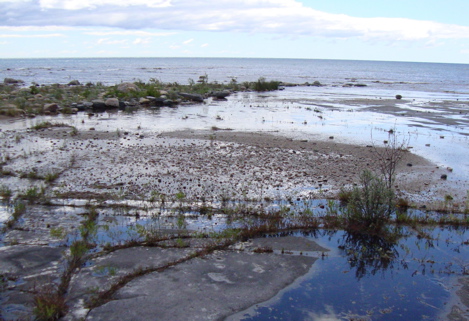
NEWS RELEASE
NATURE CONSERVANCY OF CANADA
*************************
EVANSVILLE, ON – The Nature Conservancy of Canada (NCC), along with the Government of Canada, is pleased to announce the conservation of a 1,205-acre (488-hectare) property on the southern shore of Manitoulin Island.
The property was purchased from the family of Dr. Ron Tasker, who also provided a generous donation to the project.
Dr. Tasker, an avid naturalist, first acquired property on Manitoulin Island in the early 1960s at the suggestion of a friend.
After falling in love with the area, he went on to acquire over 2,000 acres (809 hectares).
The property hosts a range of habitats including sand dunes, alvars, wetlands, forests and beaches that are home to many rare species.
The alvars are particularly impressive for their abundance and variety, including grass, shrub and tree-dominated alvars.
While many of Ontario’s alvars have been developed or used for farming, those on the Manitoulin property have been left in a natural state.
Notable plants such as globally rare Hill’s thistle thrive on this alvar habitat.
Funding for this project was provided by the Government of Canada’s Natural Areas Conservation Program and the Government of Ontario, as well as, by donations from sisters Elspeth Newall and Katrine Howe, the Southern Ontario Orchid Society, and the Hamlin Fund at the Hamilton Community Foundation.
“The southern Manitoulin Island coast is a treasure trove of biological diversity,” said James Duncan, NCC’s Ontario regional vice president. “This project exemplifies NCC’s mission to secure permanent conservation for a wide range of valuable habitats. NCC’s partnership with the Taskers and the support of other generous donors has made it possible.”
“This acquisition marks another achievement under our government's Natural Areas Conservation Program. With this investment, we are taking real action to protect and conserve our ecosystems and sensitive species for present and future generations,” said Canada’s Environment Minister Peter Kent. “Your actions today will help to protect the abundance and variety of life that will constitute an integral part of our natural heritage tomorrow.”
“I thank Dr. Tasker and his family for their generous contribution,” said Natural Resources Minister Michael Gravelle. “Dr. Tasker’s enthusiasm for protecting the rare landforms and vegetation communities on his property are very much in line with the Ontario government’s commitment to preserving the province’s ecologically significant lands. I commend the Nature Conservancy of Canada for their continuing commitment to preserve Ontario’s biodiversity for future generations.”
“On this property you have wilderness and forested property with lots of interesting, rare botany and birds; biologically, it was interesting,” said Dr. Tasker. “I wanted to see as much land as possible preserved for the future. I had to pair up with somebody, and I thought NCC was the best bet.”
About the partners
The Nature Conservancy of Canada (NCC) is the nation’s leading not-for-profit, private land conservation organization, working to protect our most important natural areas and the plants and animals they sustain.
Since 1962 NCC and its partners have helped to protect more than 2.6 million acres (one million hectares), coast to coast.
By investing in conservation we are ensuring that our natural world remains a home for wildlife, a haven for recreation and a vital resource that cleans the air we breathe and the water we drink.
Through strong partnerships NCC works to safeguard our natural areas so that our children and grandchildren will have the chance to enjoy them.
The Government of Canada’s Natural Areas Conservation Program is a $225 million investment to assist non-profit, non-government organizations to secure ecologically sensitive lands to ensure the conservation of our diverse ecosystems, wildlife, and habitat. The Nature Conservancy of Canada has been entrusted to lead the program and has committed to raising matching funds for each federal dollar received.
PHOTO CAPTION: Looking out on Lake Huron from the protected area. Photo courtesy of Nature Conservancy of Canada.
••••••••••••••••••••••••••••••